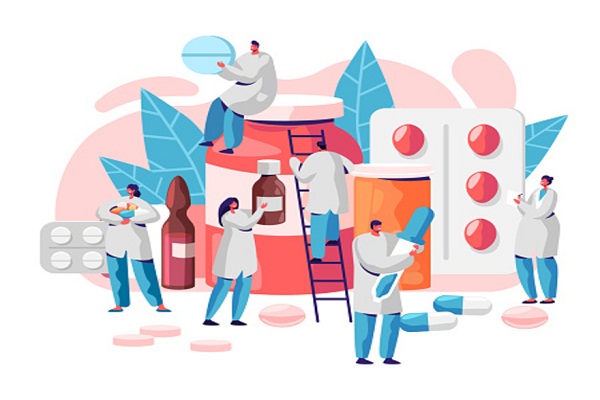
India’s pharmaceutical sector is currently the world’s third-largest and employs over a million people directly. It contributes around 1.72% of India’s GDP. The pharmaceutical sector is set to grow to US$55 billion this year of which exports alone will contribute over US$20 billion. By 2025, the biotech industry is expected to reach US$100 billion. India is the largest producer of generic drugs and the industry supplies over 50% of the global demand for various vaccines. Manpower in the pharma sector is primarily distributed over functions like research and development, production and quality control, clinical research, product specialists, distribution, sales, science writers, etc. Each role demands specific hard and soft skills.
Apart from functional domain skills, the critical skills needed are in accuracy and attention to detail, project planning and execution, team management, strategic thinking, problem-solving, inter-functional teamwork, communication, business skills, and awareness of legal and regulatory matters.

Advent of technology in the pharma sector
The pharma industry has been impacted by IR 4.0 (Industrial Revolution) with technology being deployed for various activities from R&D to manufacturing to supply chains across both inward raw material and outward distribution. Both small-scale and large-scale companies use many elements of IR 4.0 to efficiently manage the business, enhance product quality, and consequently, maximise productivity. Record protection, faster communication and electronic storage have been amongst the first to be adopted. The advent of emerging technologies like Artificial Intelligence (AI), Big Data, Internet of Things (IoT), Cloud computing, Robotic Process Automation (RPA), cybersecurity etc., have been used to enhance the efficiency and productivity in operations and processes, while retrieval of data to analyse and evaluate impact has necessitated the need for upskilling on new-age technologies and analytical skills. For example, AI has empowered researchers in healthcare with drug repurposing medicines and the development of biomarkers.
The ever-evolving technology and digital transformation in the pharma sector has led to an increased requirement to upskill existing employees who are not digitally native to be able to perform new emerging roles.

Also read: Indian pharmaceutical industry strives for self-reliance in post-COVID world
Upskilling the pharma workforce
While traditional roles like Machine Operators, QA Chemist and QC Chemist continue to dominate the workforce requirements in pharma, there has been a substantial intake of talent possessing skills like analytics, artificial intelligence, and data science. The industry needs more data analysts for patient assessments, and pre-clinical and clinical trials during drug discovery with a huge amount of data to be collected and interpreted. The COVID-19 crisis has accelerated the digital push in the pharma industry including e-sales, online consultations, online prescriptions, automated reminders for stock refills across the entire manufacturing and distribution chain, digitizing patient healthcare records and retrieval, etc.
Every employee in the pharma sector needs to be skilled on the latest technology-led tools, processes and protocols in the industry impacting their respective functions and domain-skills. They need to update their knowledge and skills, and these newly updated skills and knowledge then need to be assessed, finally leading to the deployment and application of the newly learned skills. Only comprehensive upskilling training programs can produce competent employees. To help the industry keep up with the changes and adopt agile strategies to ensure a smooth learning experience for their workforce – either through self-paced online training, live virtual classrooms, or face-to-face classroom sessions – professional training is being provided by edtech companies like Manipal ProLearn School of Pharma in collaboration with UL, to the pharma sector across traditional domain skills, soft skills and new-age technology skills.
In summary, the main areas of upskilling for the pharma sector are in five distinct areas:
Upskilling for Drug Discovery: Skills required to ensure a shortened ‘time to market’ for new drugs by training the R&D teams on various elements in the drug discovery value chain.
Upskilling for Drug Manufacturing: Training employees in end-to-end manufacturing processes for formulations to create a multi-skilled shopfloor workforce that can be deployed in any one or more areas of manufacturing.
Upskilling on Drug Regulations and Regulatory Policy/Environment: With more than 50% of India’s pharma manufacturing companies catering to exports, with US being the largest market, it has become critical to train the workforce on USFDA protocols, processes, and documentation requirements.
Upskilling on Technology Applications: Training on IR 4.0 in domains like IoT, automation, data-analytics & cloud-computing, digital marketing, etc.
Upskilling on Innovation, Creativity and Data Insights for Radical Research: Need for skilling scientists in R&D to discover new molecules, new formulations, discover new therapies to diagnose and treat the root causes rather than symptoms of various ailments.
(Disclaimer: The author is Sanjeev Goel, Business Head, Manipal ProLearn. Views expressed are a personal opinion.)
Be a part of Elets Collaborative Initiatives. Join Us for Upcoming Events and explore business opportunities. Like us on Facebook , connect with us on LinkedIn and follow us on Twitter , Instagram.












